

The Epic of Gilgamesh. Epic of Gilgamesh. The Epic of Gilgamesh: Context. Unlike the heroes of Greek or Celtic mythology, the hero of The Epic of Gilgamesh was an actual historical figure, a king who reigned over the Sumerian city-state of Uruk around 2700 b.c.
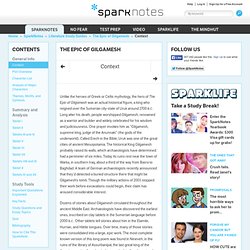
Long after his death, people worshipped Gilgamesh, renowned as a warrior and builder and widely celebrated for his wisdom and judiciousness. The Epic of Gilgamesh: Plot Overview. The Epic of Gilgamesh: Character List. The Epic of Gilgamesh: Analysis of Major Characters. Gilgamesh An unstable compound of two parts god and one part man, Gilgamesh suffers most from immoderation.
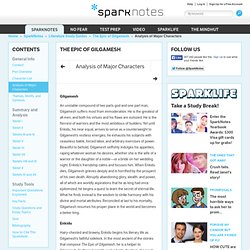
He is the greatest of all men, and both his virtues and his flaws are outsized. He is the fiercest of warriors and the most ambitious of builders. Yet until Enkidu, his near equal, arrives to serve as a counterweight to Gilgamesh’s restless energies, he exhausts his subjects with ceaseless battle, forced labor, and arbitrary exercises of power. Beautiful to behold, Gilgamesh selfishly indulges his appetites, raping whatever woman he desires, whether she is the wife of a warrior or the daughter of a noble—or a bride on her wedding night. Enkidu Hairy-chested and brawny, Enkidu begins his literary life as Gilgamesh’s faithful sidekick. Utnapishtim Utnapishtim’s name means “He Who Saw Life,” though “He Who Saw Death” would be just as appropriate, since he witnessed the destruction of the entire world.
Siduri. The Epic of Gilgamesh: Tablet I. Summary A prelude introduces us to the hero.
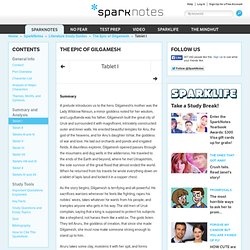
Gilgamesh’s mother was the Lady Wildcow Ninsun, a minor goddess noted for her wisdom, and Lugulbanda was his father. Gilgamesh built the great city of Uruk and surrounded it with magnificent, intricately constructed outer and inner walls. The Epic of Gilgamesh: Tablet II. Humbaba’s mouth is fire; his roar the floodwater;his breath is death.
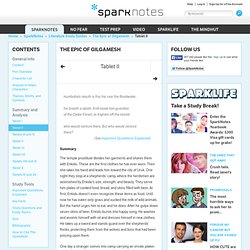
Enlil made him guardian of the Cedar Forest, to frighten off the mortalwho would venture there. But who would venture there? The Epic of Gilgamesh: Tablets III and IV. Summary Gilgamesh stands before the gates of Uruk and tells its people that he is determined to invade Humbaba’s forbidden forest to cut down the cedar trees that Humbaba protects.
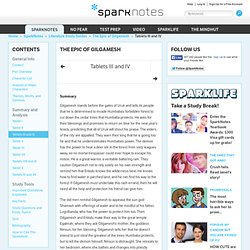
He asks for their blessings and promises to return on time for the new year’s feasts, predicting that all of Uruk will shout his praise. The elders of the city are appalled. They warn their king that he is going too far and that he underestimates Humbaba’s power. The demon has the power to hear a deer stir in the forest from sixty leagues away, so no mortal trespasser could ever hope to escape his notice. The Epic of Gilgamesh: Tablet V. Summary The two heroes stand in awe before the vast forest’s gates, marveling at the cedar trees’ height, breathing in their incense.
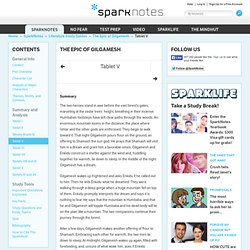
Humbaba’s footsteps have left clear paths through the woods. An enormous mountain looms in the distance, the place where Ishtar and the other gods are enthroned. The Epic of Gilgamesh: Tablet VI. What could I offerthe queen of love in return, who lacks nothing at all?
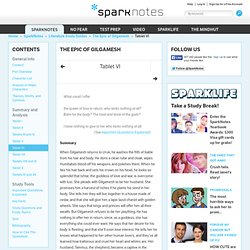
Balm for the body? The food and drink of the gods? I have nothing to give to her who lacks nothing at all. (See Important Quotations Explained) The Epic of Gilgamesh: Tablet VII. Summary Enkidu awakens from a chilling nightmare.
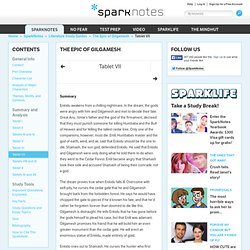
In the dream, the gods were angry with him and Gilgamesh and met to decide their fate. Great Anu, Ishtar’s father and the god of the firmament, decreed that they must punish someone for killing Humbaba and the Bull of Heaven and for felling the tallest cedar tree. Only one of the companions, however, must die. The Epic of Gilgamesh: Tablets VIII and IX. Enkidu, . . . your mother is a gazelle, and . . . your father who created you, a wild ass.

[You were] raised by creatures with tails, and by the animals of the wilderness, with all its breadth. (See Important Quotations Explained) Summary. The Epic of Gilgamesh: Tablets XI and XII. Study the brickwork, study the fortification; climb the ancient staircase to the terrace;study how it is made; from the terrace see the planted and fallow fields, the ponds and orchards.

(See Important Quotations Explained) Summary. The Epic of Gilgamesh: Tablet X. The Epic of Gilgamesh: Themes, Motifs, and Symbols. Themes Themes are the fundamental and often universal ideas explored in a literary work. Love As a Motivating Force Love, both erotic and platonic, motivates change in Gilgamesh. Enkidu changes from a wild man into a noble one because of Gilgamesh, and their friendship changes Gilgamesh from a bully and a tyrant into an exemplary king and hero. Because they are evenly matched, Enkidu puts a check on Gilgamesh’s restless, powerful energies, and Gilgamesh pulls Enkidu out of his self-centeredness.
The epic may lack a female love interest, but erotic love still plays an important role. The Inevitability of Death Death is an inevitable and inescapable fact of human life, which is the greatest lesson Gilgamesh learns. The Gods Are Dangerous Gilgamesh and Enkidu learn all too well that the gods are dangerous for mortals. Motifs Motifs are recurring structures, contrasts, or literary devices that can help to develop and inform the text’s major themes. Seductions Doubling and Twinship Journeys Baptism. The Epic of Gilgamesh: Key Facts. The Epic of Gilgamesh: Study Questions and Essay Topics. Study Questions Is the relationship between Enkidu and Gilgamesh homoerotic, and, if so, is this an important element of the story? Throughout the epic, descriptions and language of Gilgamesh and Enkidu’s relationship suggest that the love between them is more than platonic, but evidence does not exist to say with any certainty that their relationship is sexual.
For example, Gilgamesh and Enkidu love each other like man and wife, which seems to imply a sexual relationship. They kiss and embrace frequently, and in several scenes they cuddle together against the elements when they are on their quest to the Cedar Forest. What Gilgamesh does not do plays a role in defining the relationship as well. The Epic of Gilgamesh: Important Quotations Explained.